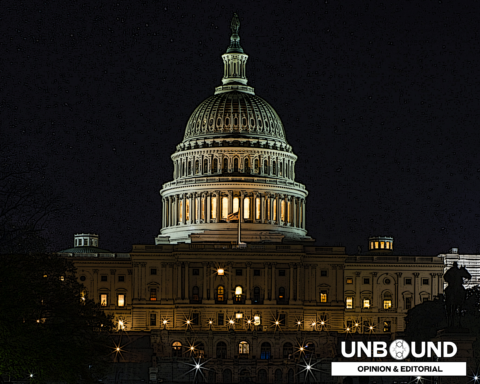Alright, youth and young adults, let’s talk about January 6th.
We are now a few weeks past the violent insurrection and attempted coup at the U.S. Capitol. If you are like me, your social media and text messages started pinging early in the afternoon on Wednesday, January 6, 2021. Around 1:45 pm, I started getting frantic messages from friends and colleagues. As I read news reports, I immediately thought of the article shared with me from a college friend months ago instructing people on what to do if there is a coup.[1] (Shoutout to Dr. George Faithful!)
As the events of Wednesday unfolded, you may have said to yourself: “Sure, I have done bad things in my life; but I certainly am not them. I’m not storming the Capitol steps.” We were horrified. We were shaken. But I’m here to tell y’all, we are them (all of us, myself included). Actually, let’s stop right here and get rid of the us/them language. We watched other people, in their full humanity, other children of God, actively attempt to disrupt the work of democracy; puffed up with hate and self-aggrandizement. As Dr. Valerie Bridgeman said, “White grievance and rage are baked into the DNA of this nation.”[2] They are us. We are them. This is our country. The images of mobs, [mostly] white folks from all over this country, is America. It is America in its deepest roots and in its bones.
On January 6, Amanda Gorman, your fellow Gen Zer and the first National Youth Poet Laureate breathed truth into this moment when she named the white supremacy of the insurrection in her Instagram post: “Unarmed black people have been killed in our own homes, our cars, our own schools. Meanwhile white protesters storm the US capitol.” In her caption, she wrote, “Correction — not protestors. Confederates.”[3]
Beloveds, to say it plainly, in the words of Fannie Lou Hamer, “we all see what hate is doing to this whole sick country at the moment. America is a sick place and man is on the critical list.”[4] And friends, white supremacy is at the root of our country’s sickness. Social worker and researcher Brené Brown, discussing dehumanization in the midst of the insurrection, quoted therapist and founder of the Ana Grace Project, Nelba Márquez-Greene: “We will never, ever address the evil of gun violence in America without addressing white supremacy. That is not the elephant. It’s the room.”[5]
On the Sunday following the insurrection at the Capitol, I made space for my youth to reflect on the events of the past week and they lamented: “what is this world we have been given?” Maybe you have asked your faith leaders a similar question: how are you called to lead in this messed up, broken world? You are right to ask these questions. We are broken and also beloved. We are called to care for our neighbors, to proclaim God’s abundant love, and to bring about God’s Kingdom on Earth. As we do the work of dismantling white supremacy and living into God’s vision of justice and liberation for all, let us be rooted in this confession: while we are all Beloved by God, we are also all complicit in upholding the systems of oppression and bending to the seductive nature of power.
As we watched the insurrection evolve, you may have felt a little like Zacchaeus: sitting in a safe space, watching the crowd. But instead of an anxious crowd ready to meet Jesus, it was an angry mob of insurrectionists foaming at the mouth with words of white supremacy on their lips and a violent posture of privilege. More than likely, you watched the news coverage with your mouth agape from your comfortable position at home, while the crowd pushed forward into the Capitol. In Luke 19, I imagine Zacchaeus was in a similar position: overwhelmed, curious, confused, trying to figure out his role in the whole mess of humanity spread out before him.
Jesus looks up at Zacchaeus and calls to him —he reaches out first. He asks Zacchaeus to come down out of the tree, to risk comfort, to be in the midst of the crowd and the mess and the chaos that is this moment. The Message translation here hints at some subtext: “Zacchaeus just stood there, a little stunned. He stammered apologetically, ‘Master, I give away half my income to the poor—and if I’m caught cheating, I pay four times the damages.’”[6] Jesus sees his humanity, treats him with dignity, and calls him by name. Zacchaeus is transformed in the moment by encountering the presence of the God incarnate; transformed to treat others with humanity, dignity, grace, and care. He is named as Beloved and in turn, wants to treat his neighbors in the same manner.
If you are like Zacchaeus, I urge you to get out of the tree. Get out of your comfortable, high and lofty place and climb into the crowd. God is present with you, with us, in this moment. In the midst of scary events, God has never left. Let us get in the middle of the mess and the chaos that is facing our complicity or talking with friends and family about the evil of white supremacy, the sin of racism, and how the church has been complicit. Get in the muck of helping hold people accountable, of wrestling with complicity, confession and repentance, and the hard work of seeking liberation for all.
And for us white folks, there is no medal ceremony, no parade for being in solidarity with our BIPOC siblings in justice work and activism. As political activist and Nobel peace prize winner Wangari Maathai reminds us, those who have combatted injustice are, “strengthened by their belief in a power greater than their own. They understood tasked for the community as a whole and struggled for something more than simply their own material gain or social empowerment. They worked for the common good because they embraced the value of service.”[7] Working for the common good requires moral courage. As Rev. Jacqui Lewis wrote, “As people of faith and moral courage we must accept our leadership role and join together in prophetic grief and divine outrage to critique our racist culture in which being Black is a preexisting condition for poverty, discrimination, and death.”[8] A world that looks like God’s kingdom on earth. Resist. Name evils. Love your neighbor. Take the words of Dr. Ulysses Burley III to heart:
“The Beatitudes suggest that whatever brings wholeness, transformation, and healing to communities is in-and-of-itself a form of resistance against that which seeks to rob us of our livelihood. So, let us RESIST the empire’s attacks; let us RESIST racism and white supremacy; let us RESIST partisanship and divisiveness, and let us strike back until kingdom come and God’s will be done.”[9]
Wednesday, January 6, 2021, was not only the “day of the insurrection,” it was also Epiphany. It is the day we celebrate the gifts the wise ones brought to the toddler Jesus. The wise ones were sent by King Herod, to search out the one who would threaten his power, and to report back. They followed a star, they arrived, honored the child and then “were warned in a dream not to return to Herod, they went back to their country by another route.”[10]
Even if the Magi didn’t know Herod’s entire plan, they were complicit because they accepted a gig from the empire. However, in meeting Jesus, they were transformed; in being in the presence of God, they worshiped God and walked away from the lure of power and empire. Diana Butler Bass charges us to be similarly transformed, “And then — once we let that truth fill us — we do not go home the way we came. Because there will always be some Herod whose fear leads to violence and death. We will leave this Epiphany by another road.”[11] The Magi refused to take part in a plot to murder a small child and refused to play a part in the unjust, oppressive system of Herod. They were changed in the presence of the living, breathing, squirming toddler God incarnate. They were early disciples, even before Jesus asked his friends to drop what they were doing to heal some people and eat dinner with some outcasts.
Friends with privilege, the imperialist white supremacist capitalist patriarchy[12] power structure may promise you power, comfort, and recognition; when it does, think of the Magi, turn your gaze and point your feet toward the edges of society toward the oppressed and marginalized. With every step, know this path of following Jesus leads toward justice and liberation. Transformation happens when we acknowledge and recognize how we are complicit in the systems that want to keep us bound. Our call continues when we reach for our neighbors to join us. Y’all, know that you are Beloved and in the words of Emilie Townes, remember “to be called beloved / is to be called by God / to be called by the shining moments / to be called deep within deep” to remember you are “we are washed in the grace of God.”[13] Denounce the insurrection and name it for what it was: the evil of white supremacy on full display. Keep walking, even when it gets hard, because the reward is honoring the dignity of your neighbor because “nobody’s free, until everybody’s free.[14]
You have agency and you have a voice; get in the mess of the crowd, embrace the reality of following Jesus and, if this work is new for you, take this new route home. Do justice, love kindness, and walk humbly forward into this a world you will help construct.
[1] Daniel Hunter, “10 things you need to know to stop a coup,” Waging Nonviolence, last revised September 18, 2020, https://wagingnonviolence.org/2020/09/10-things-you-need-to-know-to-stop-a-coup/.
[2] Dr. Valerie Bridgeman, “Chaos in the Capitol: What Will We Preach This Sunday?” Church Anew, January 8, 2021, https://churchanew.org/blog/posts/chaos-in-the-capitol-what-will-we-preach-this-sunday.
[3] Amanda Gorman, @AmandaSCGorman, Instagram post, January 6, 2021, https://www.instagram.com/p/CJt4IhulFdd/
[4] Fannie Lou Hamer, “‘America Is a Sick Place, and Man Is on the Critical List,’ Speech Delivered at Loop College, Chicago, Illinois, May 27, 1970,” in The Speeches of Fannie Lou Hamer: To Tell It Like It Is, Maegan Parker Brooks and Davis W. Houck, eds. (Jackson: University Press of Mississippi, 2011), 115.
[5] Nelba Márquez-Greene, Twitter post, August 3, 2019 (5:50 p.m.), https://twitter.com/Nelba_MG/status/1157785836437594113.
[6] Luke 19:8 (The Message)
[7] Wangari Maathai, Replenishing the Earth: Spiritual Values Healing Ourselves and the World (New York: Doubleday, 2010), 160-161, Kindle.
[8] Jacqui Lewis, “How the Capitol police privileged white rage,” Religion News Service, January 8, 2021,https://religionnews.com/2021/01/08/how-the-capitol-police-privileged-white-rage/.
[9] Dr. Ulysses Burley III, “Chaos in the Capitol: What Will We Preach This Sunday?” Church Anew, January 8, 2021, https://churchanew.org/blog/posts/chaos-in-the-capitol-what-will-we-preach-this-sunday.
[10] Matthew 2:12 (CEB)
[11] Dr. Diana Butler Bass, “Chaos in the Capitol: What Will We Preach This Sunday?” Church Anew, January 8, 2021, https://churchanew.org/blog/posts/chaos-in-the-capitol-what-will-we-preach-this-sunday.
[12] George Yancy and bell hooks, “bell hooks: Buddhism, the Beats and Loving Blackness,” The Stone in Opinionator of The New York Times, December 10, 2015, https://opinionator.blogs.nytimes.com/author/bell-hooks/.
[13] Emilie M. Townes, “To Be Called Beloved: Womanist Ontology in PostModern Refraction.” The Annual of the Society of Christian Ethics 13 (1993): 93-115, Accessed January 16, 2021, http://www.jstor.org/stable/23559557.
[14] Fannie Lou Hamer, “‘Nobody’s Free Until Everybody’s Free,’ Speech Delivered at the Founding of the National Women’s Political Caucus, Washington, D.C., July 10, 1971,” in The Speeches of Fannie Lou Hamer: To Tell It Like It Is, Maegan Parker Brooks and Davis W. Houck, eds. (Jackson: University Press of Mississippi, 2011), 136.

Sarah Leer (she/her/hers) is a native Arkansan who served PCUSA churches in Austin, Northwest Arkansas, and currently serves in Dallas, TX. Sarah is a graduate of Wake Forest University, Columbia Theological Seminary, and the Clinton School of Public Service. She is a practical theologian who is working on her Doctorate in Educational Ministry at Columbia Theological Seminary. A lifelong Presbyterian, Sarah has served as a Young Adult Volunteer in New Orleans, as the Moderator of the Young Adult Volunteer Alumni Council, as the Adult Co-Moderator for the Youth Advisory Team and on CPM for the Presbytery of Arkansas, and on the board of the Presbyterian Youth Workers’ Association. Sarah enjoys singing Broadway songs in her car, random road trips and adventures, geeking out over pop culture, traveling the world with friends, hanging out with her family, watching college football, and attending youth conferences that include energizers.





Unbound Social